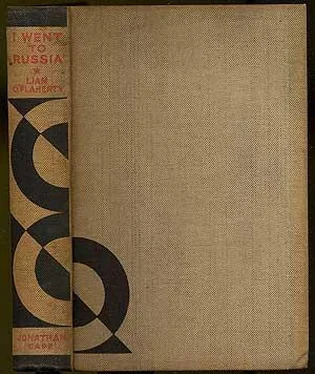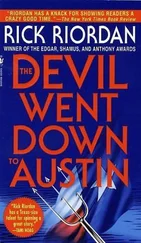Liam O'Flaherty - I Went to Russia
Здесь есть возможность читать онлайн «Liam O'Flaherty - I Went to Russia» весь текст электронной книги совершенно бесплатно (целиком полную версию без сокращений). В некоторых случаях можно слушать аудио, скачать через торрент в формате fb2 и присутствует краткое содержание. Город: London, Год выпуска: 2011, ISBN: 2011, Издательство: Bloomsbury Publishing, Жанр: Публицистика, на английском языке. Описание произведения, (предисловие) а так же отзывы посетителей доступны на портале библиотеки ЛибКат.
- Название:I Went to Russia
- Автор:
- Издательство:Bloomsbury Publishing
- Жанр:
- Год:2011
- Город:London
- ISBN:9781448205592
- Рейтинг книги:5 / 5. Голосов: 1
-
Избранное:Добавить в избранное
- Отзывы:
-
Ваша оценка:
- 100
- 1
- 2
- 3
- 4
- 5
I Went to Russia: краткое содержание, описание и аннотация
Предлагаем к чтению аннотацию, описание, краткое содержание или предисловие (зависит от того, что написал сам автор книги «I Went to Russia»). Если вы не нашли необходимую информацию о книге — напишите в комментариях, мы постараемся отыскать её.
I Went to Russia — читать онлайн бесплатно полную книгу (весь текст) целиком
Ниже представлен текст книги, разбитый по страницам. Система сохранения места последней прочитанной страницы, позволяет с удобством читать онлайн бесплатно книгу «I Went to Russia», без необходимости каждый раз заново искать на чём Вы остановились. Поставьте закладку, и сможете в любой момент перейти на страницу, на которой закончили чтение.
Интервал:
Закладка:
The pier to which our ship was moored was deserted. I was a trifle piqued at not finding a mass of dockers, with hooks at belt, ready to board us. Neither were there any cranes with tremendous teeth, ready to drag the masses of zinc for the Five Year Plan from the bellies of our ship. In fact, I saw nothing on the pier but a solitary soldier. On inspection, this soldier proved more interesting than the greatest possible mass.
He was standing on the very edge of the pier, looking very melancholy, owing to his being cut off by the exigencies of military routine from the mass of his comrades. Although I examined him for fully twenty minutes, the wretch never moved a muscle during the whole of that period. His weapon lay within his folded arms, just as if it were a baby some shyster truff had given him to hold and then decamped, leaving the fellow with something of which he did not know how to dispose without getting into trouble. By the gloomy aspect of his countenance and the forlorn state of his dress, it was certainly obvious that the possession of his weapon did not inspire him with any sense of military pride. He wore a stocking cap, which had ear flaps and a chin strap and a pinnacle and the Soviet arms on the forehead. His greatcoat was at least six sizes too large for him. An enemy could easily bind him securely with the unnecessary ends of the sleeves, which reached at least a foot beyond the tips of his outstretched fingers. The skirts of the coat touched the ground, giving the impression that he had built a tent about himself, with his head sticking through the roof, like a periscope.
The fact that he had pitched his tent on the edge of the pier, on the verge of enormous Russia and that he was looking into the sea gloomily, convinced me that if his greatcoat were a balloon instead of being a tent and the wind favourable, he would float off at once, fondling his weapon, to the conquest of Europe, without waiting for the mass of his comrades. For he DID look tired of enormous Russia.
As I watched, I pondered on the possible military use of this individual. I could find none. His overcoat made movement practically impossible. The sheer stupidity depicted in his countenance made it impossible for me to believe that he knew how to use his weapon should he be attacked. Indeed, had somebody tried to persuade me that the man was a comic monument, wrought in the new grotesque style of Soviet sculpture, as a satire on Standing armies, he would have had no difficulty in persuading me.
Carrying my suitcase and my typewriter and accompanied by the doctor, I landed on the pier and set out for the city on foot. The doctor had invited me to meet his family before going to an hotel.
The docks were enormous. There were hardly any human beings about, but we had to make wide detours in order to avoid long trains that lay everywhere, ready to shift masses of matter sometime, somewhere. God only knows when or where. Wandering over this enormous and empty place, over ground that was as uneven and battered as the battlefields of France during the world war, a horrible melancholy took possession of me, such melancholy as I have not experienced since I read Dostoievsky’s House of The Dead. But the doctor’s enthusiasm was proof against any form of melancholy. He waved the parcels in which he carried his shore rations and cried:
‘Very big. Powerful. Gigantic.’
‘That’s true,’ I said. ‘But what are you going to do about it?’
‘How?’
‘It’s certainly gigantic but nobody seems to be working.’
‘Yes?’ he said.
He halted for a few moments, looked about him, shook his head, frowned and then smiled in his usual ecstatic manner, when contemplating the progress of the Soviet Union, with special emphasis on the Five Year Plan.
‘At present,’ he said, ‘the situation is such. The activity is underground. At the end of Five Year Plan it shall be overground. Let us go.’
A little farther on we halted to take a rest. The doctor enlarged on his idea of underground and overground activity in relation to the docks.
‘In bourgeois countries,’ he said, ‘the situation is such. Very much dock activity contributes nothing to positive social results. Indeed very much negative social results. For example, potatoes are brought to England from France and then same potatoes are brought to Argentine from England and then to Cape Town and back again to Marseilles where the French put them in their soup. Here there is no such activity with potatoes or other commodities. There is only such movement of commodities as is socially necessary. Potatoes are moved to nearest stomachs. So for present, instead of making socially unnecessary movements of socially necessary commodities, we concentrate on Five Year Plan and afterwards we export large masses of commodities by means of this dock.’
‘But tell me,’ I said, ‘as a special favour, what IS the Five Year Plan?’
‘For building up industries of Soviet Union.’
I thought of suggesting that while the dockers were waiting to move the masses of commodities to be produced by the Five Year Plan they might amuse themselves by repairing the docks, but I refrained on realising that the suggestion might be indelicate.
Having undergone another customs’ examination at the dock gates, we debouched into the city. Then indeed I fell into a fever of excitement. Everybody has read accounts of the Paris mobs that thronged the streets after the French Revolution, with red bonnets and without trousers (or at least poorly trousered), but it is impossible to realise the redness of these mobs without seeing a similar mob in Russia in the full flush of red bonnetry and untrouseredness. When I saw the revolutionary hordes of men, women and children moving excitedly back and forth in the streets that lay beyond the waste place surrounding the dock gates, I very nearly went into an ecstasy.
And the dramatic instincts of the Russian people had provided a striking contrast to the excited mob in order to intensify their revolutionary excitedness. For a great number of sleeping cab horses and sleeping cab drivers lay between me and the mob, relics of the old, pre-revolutionary regime, somnolent, decadent, in opposition to the fervent enthusiasm of the beings of the new era.
For the first few moments I did not notice the cabmen. I wanted to embrace the red-capped women and thank them for their courtesy, since they had stuck to the outer show of revolution for thirteen years after the outbreak of revolution, presumably for my benefit. Then, when the first stage of my ecstasy passed, I took notice of the cabmen.
Astonishing! They were the famous Ish.. v.. xz .. ki (utterly impossible to spell) that figure in books written by foreigners about Russia. Their cabs resembled slightly the chair carriage of the eighteenth century. They were incredibly dirty and old. The harness was of crude design, the most amazing part of it being a huge yoke that towered above the horse’s head. The horses were equally disreputable, shaggy nags, not far from death. The drivers were more odd than anything the most imaginative child could dream of seeing in the zoological gardens, which Uncle James said he had seen in Bangkok. Both the horses and the drivers were in that state which is neither sleep nor wake, but a kind of idle trance from which a sudden shout or a flea bite might send them flying at furious speed, lashing, prancing, neighing, cursing.
‘Hurrah!’ I cried to the doctor. ‘This is marvellous. This is a scene which an American film producer might buy lock, stock and barrel as a studio. I refuse to move from here except in one of those cabs.’
But the man was impossible.
‘Please understand,’ he said. ‘The situation is such. These cabs are relics of Tsarism. It is our proletarian duty to liquidate them. We shall use instead taxis of a modern plan. These drivers are all counter-revolutionaries. They are drunkards and immoral. They charge very great prices. It is impossible for any friend of Soviet Russia to encourage them by being carried to any destination in such a manner. Instead, we shall go in a tramway, which is a scientific method of movement, commonly used by the proletariat.’
Читать дальшеИнтервал:
Закладка:
Похожие книги на «I Went to Russia»
Представляем Вашему вниманию похожие книги на «I Went to Russia» списком для выбора. Мы отобрали схожую по названию и смыслу литературу в надежде предоставить читателям больше вариантов отыскать новые, интересные, ещё непрочитанные произведения.
Обсуждение, отзывы о книге «I Went to Russia» и просто собственные мнения читателей. Оставьте ваши комментарии, напишите, что Вы думаете о произведении, его смысле или главных героях. Укажите что конкретно понравилось, а что нет, и почему Вы так считаете.












